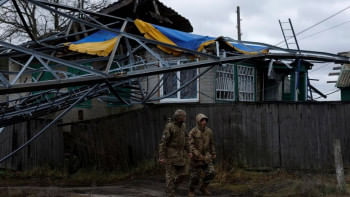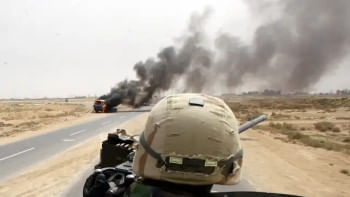The Global Game of ChessGo

Games are imitations of real life. They teach players how to think how the other would act, with better players learning to appreciate how the other player reads them. As all games are defined by rules, two-player games are actually far simpler than multi-player games. That is exactly where the global game has shifted, from a unipolar single dominant player who determines the rules-based order, to one in which the others want voice and power to change the rules.
So, we are back to how Numero Uno reads the game, and how the others read him.
The kiddie's game of checkers teaches players to think linearly, but smart players quickly learn that if you offer the other side a quick win and he takes it, you crush him by anticipating several moves ahead of him.
The game of chess is much more complicated, with pieces that have different power, and can be promoted (pawn to become queen). The moves are much more complicated with psychology and stamina key to who wins.
The game of Go, popular in the East, has only black or white pieces, but is far more complex, because you have to think spatially, manoeuvring your pieces to outwit your opponent. Today, computers can be taught and self-taught to outplay the best human players, which is why the Great Powers are in a Chip War, investing in computer semiconductors and processing power to simulate war games with each other, plus upgrading the accuracy and firepower of smart weapons.
But the smartest of weapons can be wielded by dumb users, leading to accidental conflicts. We are in that dangerous phase right now.
The Ukraine war is a litmus test of Principle over Practicality, with Nato (basically US calling the shots), having a mindset that the principle of sovereignty over-rides everything else. The 20th anniversary of the illegal invasion of Iraq reminded the Rest of the World that Nato does not necessarily follow its own principles consistently.
The Ukraine war is a massive tragedy, because from a practical point of view, Ukraine will pay for that principle to the last Ukrainian, if not being completely flattened by unceasing conflict. The underlying US objective of the Ukraine war is to weaken Russia, as revealed by US Secretary of Defence Lloyd Austin.
History teaches us that all wars, just or unjust, end up with negotiations, so war is a conflict to strengthen your bargaining position for best or least-worst outcome. Principles end up with pragmatism. In the nuclear game, either you negotiate or everyone gets annihilated.
So, what is the game of ChessGo all about? Basically, on the global chessboard, can the West (Nato and allies) contain the rise of its perceived "existential rivals", namely, Russia and China? In essence, the Rest (non-West or East) will decide who has the upper hand.
ChessGo therefore is the game of thrones where all powers position themselves over the long haul so that they will be able to defend themselves or at least thwart their rivals. Chess is the linear projection of power from the player point of view, Go is how to surround your opponent by moving anywhere in the chessboard.
The Ukraine war is a litmus test of Principle over Practicality, with Nato (basically US calling the shots), having a mindset that the principle of sovereignty over-rides everything else. The 20th anniversary of the illegal invasion of Iraq reminded the Rest of the World that Nato does not necessarily follow its own principles consistently.
From a perspective of people, wealth and land/sea resources, it is too early to tell who will win. Population-wise, the West has 1.2 billion out of 8 billion, whereas China and Russia have 1.5 billion and the Rest 5.2 billion. The West is rich in terms of GDP, but that also depends on whether you measure by market exchange rate or Purchasing Power Parity (PPP). However, if you combine land area plus Exclusive Economic Zone (EEZ), the West has 46.4 million sq kilometres, compared with 35.9 million for China and Russia. The Brics countries have combined 53.5 millon sq.km.
The Americans won the Cold War by containing the Soviet Union through pulling China out of the Soviet camp, so that it became two versus one. Today, by identifying China and Russia as "existential threat", Nato achieved what historical military-strategists have always feared – fighting against two rivals, but one contiguous Eurasian land-mass which no single navy can surround.
The Ukraine war revealed that Russia is not a "gas station" with the GDP of Texas. She has a nuclear power with the largest land area in the world, with everything she needs in terms of food, energy and mineral resources. China has economic and people clout, but lacks natural resources to power her economy. By pushing Russia and China together, Nato has created a formidable self-sufficient set of rivals. Kissinger was wise to balance power to two-to-one. Biden's blinking foreign policy is to take on both Russia and China with an internally divided nation, united only in being anti-China.
This global rivalry is already becoming a Hundred Year Marathon, not a quick win for anyone. Europe and the Rest will side with the winner. Europe is now clearly deeply weakened by the Ukraine war, having its cheap food, energy and mineral sources cut off by alienation of Russia. European costs will go up, and she fears migration from Africa and Asia when climate change drives the young population to move West and North to Europe. If the Ukraine war continues to drag on, Europe will not recover economically. The outcome may be a global recession reminiscent of the 1930s.
America remains the fortress defended by the Atlantic and Pacific Oceans. But how long can she maintain the largest military in the world if the global economy moves into recession?
War cannot be the solution to global peace and prosperity. War and more defence spending will not get us out of climate warming, inflation, debt distress, financial crises and job-disruption from technology.
There is no endgame in war, only wealth and health destruction. Better sense will prevail when everyone loses sufficiently from the fever of war and get back to practical living with each other. ChessGo is not going to end anytime soon.
Andrew Sheng is a distinguished fellow of Asia Global Institute, University of Hong Kong, and chief adviser to the China Banking Regulatory Commission.
Copyright: Asia News Network

 For all latest news, follow The Daily Star's Google News channel.
For all latest news, follow The Daily Star's Google News channel. 





Comments